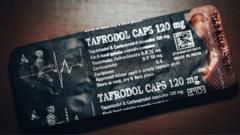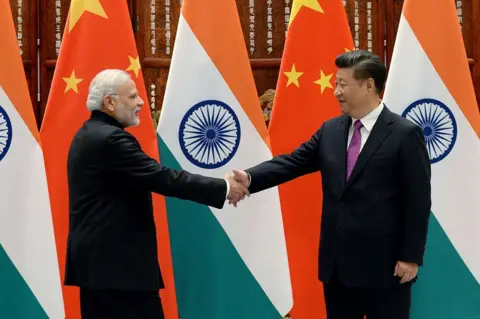In a significant move, Indian authorities have announced a ban on two highly addictive opioids amid rising concerns over their contribution to a public health crisis in West Africa. This decision follows an in-depth investigation by the BBC, which uncovered that a Mumbai-based company, Aveo Pharmaceuticals, was illicitly exporting a dangerous combination of tapentadol and carisoprodol to countries such as Ghana, Nigeria, and Côte d'Ivoire.
In a letter from Dr. Rajeev Singh Raghuvanshi, India's Drugs Controller General, the ban was confirmed, stating that the authorization for both manufacturing and exporting these drugs has been revoked. This action was prompted by not only the BBC's findings but also a comprehensive review by officials on the drugs’ potential for abuse and their harmful effects on populations.
The opiate tapentadol, a potent pain reliever, paired with carisoprodol, a muscle relaxant banned in Europe due to its high addictive nature, has been linked to rising addiction rates in West African nations. Carisoprodol is permitted for use in the U.S. but only for limited durations, as withdrawal symptoms may include severe anxiety and hallucinations. The dangerous combination, which is not legally sanctioned anywhere worldwide due to its risks, poses serious health threats, including respiratory complications and potential overdose fatalities.
Despite these hazards, the use of these opioids as inexpensive street drugs has gained popularity across various West African countries. Public export data reveals that Aveo Pharmaceuticals, alongside a sister company, Westfin International, dispatched millions of tablets to the region. The BBC's investigation illustrated the pervasive distribution of Aveo-branded pills on the streets of Nigeria and within Ivoirian communities. With an estimated four million Nigerians struggling with opioid dependency, the demand for these drugs is alarmingly high.
As part of their investigation, the BBC infiltrated one of Aveo's Indian factories with an undercover operative posing as a prospective client to reveal the alarming business conduct within the company. Footage captured a director of Aveo, Vinod Sharma, candidly acknowledging the harmful effects of the pills while referring to their sales as "business." Such revelations emphasized the urgent need for regulatory action.
In response to the findings, India's Food and Drug Administration (FDA) conducted a crackdown on Aveo, leading to the confiscation of its entire inventory and the cessation of production. The agency signaled its intent to pursue legal measures against Aveo and anyone implicated in these illicit activities. In order to safeguard its citizens, the FDA will also enhance inspections to halt the further spread of these detrimental drugs.
In a letter from Dr. Rajeev Singh Raghuvanshi, India's Drugs Controller General, the ban was confirmed, stating that the authorization for both manufacturing and exporting these drugs has been revoked. This action was prompted by not only the BBC's findings but also a comprehensive review by officials on the drugs’ potential for abuse and their harmful effects on populations.
The opiate tapentadol, a potent pain reliever, paired with carisoprodol, a muscle relaxant banned in Europe due to its high addictive nature, has been linked to rising addiction rates in West African nations. Carisoprodol is permitted for use in the U.S. but only for limited durations, as withdrawal symptoms may include severe anxiety and hallucinations. The dangerous combination, which is not legally sanctioned anywhere worldwide due to its risks, poses serious health threats, including respiratory complications and potential overdose fatalities.
Despite these hazards, the use of these opioids as inexpensive street drugs has gained popularity across various West African countries. Public export data reveals that Aveo Pharmaceuticals, alongside a sister company, Westfin International, dispatched millions of tablets to the region. The BBC's investigation illustrated the pervasive distribution of Aveo-branded pills on the streets of Nigeria and within Ivoirian communities. With an estimated four million Nigerians struggling with opioid dependency, the demand for these drugs is alarmingly high.
As part of their investigation, the BBC infiltrated one of Aveo's Indian factories with an undercover operative posing as a prospective client to reveal the alarming business conduct within the company. Footage captured a director of Aveo, Vinod Sharma, candidly acknowledging the harmful effects of the pills while referring to their sales as "business." Such revelations emphasized the urgent need for regulatory action.
In response to the findings, India's Food and Drug Administration (FDA) conducted a crackdown on Aveo, leading to the confiscation of its entire inventory and the cessation of production. The agency signaled its intent to pursue legal measures against Aveo and anyone implicated in these illicit activities. In order to safeguard its citizens, the FDA will also enhance inspections to halt the further spread of these detrimental drugs.






















